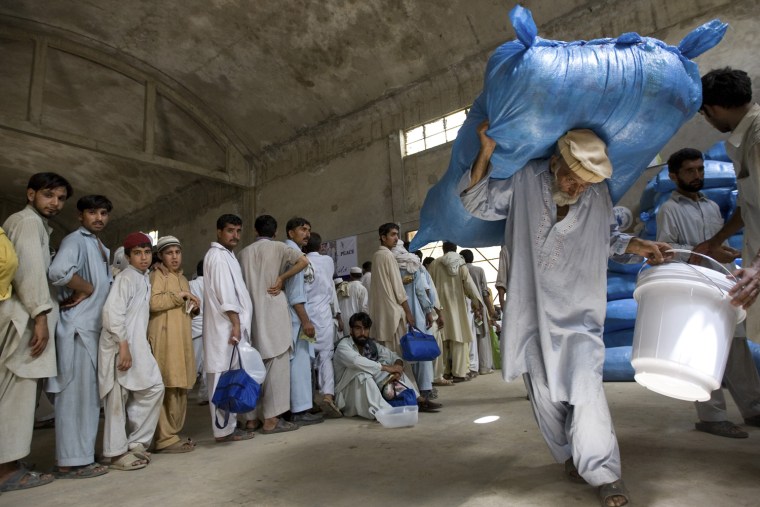Pakistan will allow some 2 million people who fled an army offensive against the Taliban in Swat Valley to return home next week, the prime minister announced Thursday, saying the region was now secure and essential services restored.
The refugees have stayed in crowded camps and in homes just south of the northwestern region. It remains unclear how quickly they will return, but anecdotal accounts from refugees in recent days suggest most were eager to go home but short of money.
"The electricity has been restored, the gas has been restored, the gas stations have been restored and even the banks have been restored," Prime Minister Yusuf Raza Gilani said in a televised news conference. He said people will be allowed to return starting July 13, adding that the army would remain in the valley to ensure the Taliban did not return.
Cash handouts promised
Maj. Gen. Nadeem Ahmad, who is in charge of the displaced, said more details on how the government intends to assist their return would be announced later. He said those living in camps — an estimated 100,000 people — would be the first to be allowed home.
The government has promised to give a cash handout to those returning to help them get back on their feet.
The United Nations, which is helping feed, clothe and shelter the refugees, wants to see them return but "only when it was safe for them to do so and if it is voluntary," according to Stephanie Bunker, a spokeswoman for the world body's office for the coordination of humanitarian affairs.
Some refugees have already started returning to Buner district, which was the first area cleared of militants and is closest to the refugee camps. Mingora, the largest city in the valley, remains deserted.
The military launched the Swat offensive more than two months ago after Taliban militants violated the terms of a cease-fire and began advancing into areas close to the capital. The army claims to have cleared nearly all the valley and killed more than 1,500 insurgents.
Insurgents blamed for violence
The offensive was praised by the United States and other Western allies, which have tried for years to get Pakistan to crack down on militants close to the Afghan border. The insurgents are blamed for spiraling violence in both nuclear-armed Pakistan and neighboring Afghanistan.
Even as hostilities wind down in Swat, the government is stepping up a campaign in South Waziristan, another region in the northwest and the stronghold of Baitullah Mehsud, the head of the Pakistani Taliban.
Earlier Thursday, Pakistani jets killed 12 suspected militants in the Ladha and Kani Guram areas of South Waziristan, intelligence officials said on condition of anonymity because they were not allowed to speak to the media.
On Wednesday, suspected U.S. drones fired missiles at a Taliban training camp and a convoy, killing up to 45 militants, intelligence officials said. Independent verification of events in South Waziristan is not possible because the region is remote, dangerous and largely inaccessible to journalists.
The government routinely protests suspected U.S. missile strikes as violations of Pakistani sovereignty and has publicly asked the U.S. to give it technology to launch its own attacks. But many analysts suspect the government — which has received billions of dollars from the U.S. since 2001 — supports the strikes, especially those against Mehsud and his followers.
5 soldiers killed in roadside attack
Meanwhile, a roadside bomb destroyed a vehicle carrying troops in a remote area of southwestern Baluchistan province on Thursday, killing five soldiers and wounding three, area police chief Abdul Malik Marwan said.
No one claimed responsibility, and police said they were still investigating.
Also in the northwest on Thursday, a bomb went off near an electricity pole on the outskirts of the city of Peshawar, killing an engineer from the state-run power distribution company, police official Alam Sher said. The engineers were dispatched to the area after another bomb exploded there.
Insurgents have in the past attacked the electricity supply network in Peshawar, which is the largest city in the northwest.
